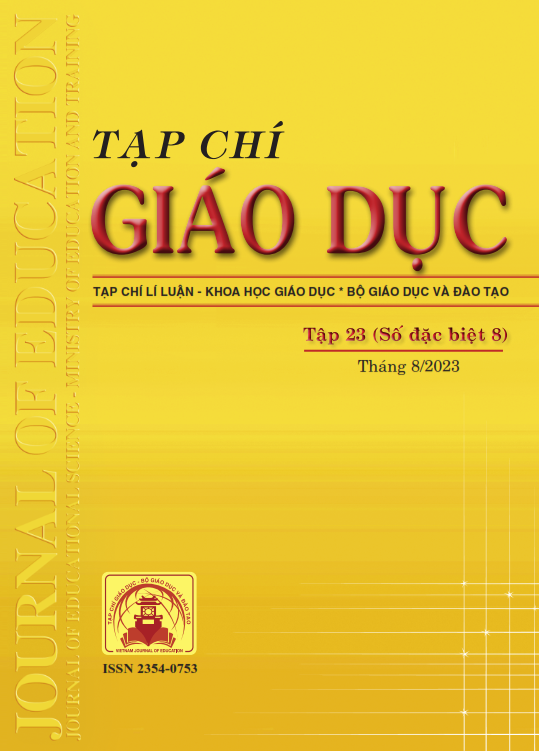Đề xuất một số biện pháp giáo dục tính tự lập cho trẻ 3-4 tuổi dựa trên tiếp cận tham gia ở trường mầm non
- Từ khóa:
- Trust
- self-discipline
- self-choice
- empowerment
Tóm tắt
Independence helps each person become aware, responsible for themselves, know how to plan, act on their own, overcome difficulties by themselves. Along with that, independence also stimulates people's creativity and more comprehensive awareness of all aspects and social issues. Therefore, independence education for preschool children is an urgent issue, meeting the current educational innovation requirements. The study proposes three groups of measures to educate independence for 3-4-year-old children based on the participation approach in preschool. Groups of measures to educate children's independence under a participatory approach are based on the fact that educators always trust, listen to children's opinions, encourage, empower and inspire children; from the step of preparation and implementation to the group of measures to strengthen and coordinate with young families. Each group of measures has its own strengths and has a positive impact on children. Therefore, in the process of implementing measures, teachers need to carry out synchronous measures to comprehensively affect children and fully form children's competences.
Tài liệu tham khảo
Ban Chấp hành Trung ương (2013). Nghị quyết số 29-NQ/TW ngày 04/11/2013 về đổi mới căn bản, toàn diện giáo dục đào tạo, đáp ứng nhu cầu công nghiệp hóa, hiện đại hóa trong điều kiện kinh tế thị trường định hướng xã hội chủ nghĩa và hội nhập quốc tế.
Ferholt, B., & Nilsson, M. (2017). The Routledge International Handbook of Early Childhood Play. Routledge.
Gordon, T. (1995). Nghệ thuật nói để con bạn nghe lời. NXB Phụ nữ.
Gravatt, L., & Flatau, A. (2006). Resonance-based low-frequency synthetic jet actuator modeling, design, and testing. Proc. SPIE 6173, Smart Structures and Materials 2006: Smart Structures and Integrated Systems, 61730L. https://doi.org/10.1117/12.658816
Hoàng Phê (chủ biên, 2008). Từ điển tiếng Việt. NXB Đã Nẵng.
Hoàng Thị Phương, Lã Thị Bắc Lý, Bùi Thị Hạnh Lâm, Nguyễn Mạnh Tuấn, Nguyễn Thị Mỹ Dung, Vũ Thanh Vân (2016). Tổ chức hoạt động giáo dục theo hướng trải nghiệm cho trẻ ở trường mầm non. NXB Đại học Sư phạm.
Lê Hương Ly (2005). Phương pháp rèn con trẻ tính tự lập. NXB Lao động.
Lê Thị Huyên (2020). Giáo dục tính tự lập cho trẻ mẫu giáo 3-4 tuổi thông qua chế độ sinh hoạt hàng ngày ở trường mầm non. Luận án tiến sĩ Giáo dục học, Trường Đại học Sư phạm Hà Nội.
Saleh, M., Purwanti, R., Mardatila, Y., & Madani, R. A. (2022). A Case Study of Culturing Children’s Independence Attitude Through Parent’s Role and Teacher’s Role. Jurnal Pendidikan dan Pemberdayaan Masyarakat, 9(1), 39-49.
Sinclair, R. (2004). Participation in Practice: Making It Meaningful, Effective and Sustainable. Children and Society, 18, 106-118.
Vũ Dũng (chủ biên, 2012). Từ điển thuật ngữ tâm lí học. NXB Từ điển Bách khoa.
Wahyuni, S., Fadilah, S., & Bastian, A. (2020). Children’s independence Skills Analysis at Low Socioeconomic Environment. JPUD - Jurnal Pendidikan Usia Dini, 14(2), 303-312.
Westlund, H., & Larsson, J. P. (2016). Handbook of social capital and regional development. Handbook of Social Capital and Regional Development. Edward Elgar Publishing Ltd.
Đã Xuất bản
Cách trích dẫn
Số
Chuyên mục
Giấy phép

Tác phẩm này được cấp phép theo Ghi nhận tác giả của Creative Commons Giấy phép quốc tế 4.0 .












